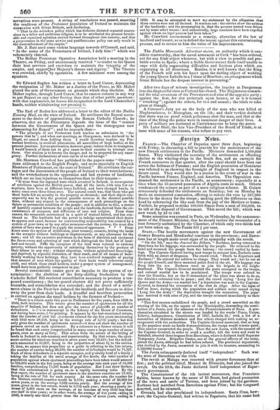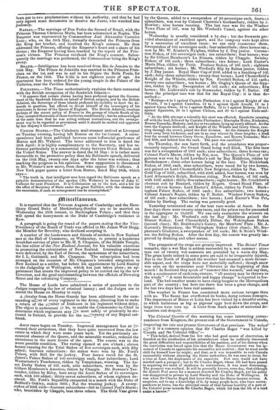ffortign Netus.
FRANCE—The Chamfer of Deputies spent three days, beginning- with Friday, in discussing a bill to provide for the maintenance of the- new French settlements in the Pacific. Ministers demanded 5,500,00a francs. They vindicated the necessity of the settlements as affording shelter to the 'whaling-ships in the South Sea, and an entrepOt for French commerce in that quarter, after the canal should have been cut across the Isthmus of Panama; and the English possession of Honduras was referred to as showing the foresight of England in respect to the future canal. They would also be a station in the event of war in the-
Pacific between France, England, and America. The Opposition con- demned the settlements in the Pacific, as unnecessary; especially at a time when the ill-secured possession Of Algeria costs so much. Others condemned the seizure as part of a mere religious scheme. M. Guizot strenuously defended the settlements on Saturday; but on Monday he made an unexpected concession, offering to reduce the vote Ey 397,000. francs in the money for the troops ; making good the difference on that head by subtracting the like sum from the pay of the Marines at home.. Further, he proposed to strike 100,000 francs from a sum of 300,000, to- be left at the disposal of Government. This saved the bill; which wag now voted, by 22 to 140.
Some sensation was created in Paris, on Wednesday, by the announce- ment of the Finance Minister, that he should realize the remainder of a. loan formerly authorized by the Chamber, of which only two-thirds had yet been taken up. The Funds fell per cent.
SPAIN.—The hostile movements against the new Government off Gomez Becerra and Mendizabal continue in the provinces ; and Barce- lona has at length made overt signs of its sympathy with the revolt. " On the 5th," says the Journal des Dibats, " Zurbano, having returned to- Barcelona for his baggage, was surrounded by the people. He returned to the hotel and menaced the people from the balcony : the crowd replied by hoot- ings. The Captain-General having sent troops to succour him, Zurbano came forth with an escort of dragoons. The crowd cried, ' Death to Espartero and Zurbano!' He ordered the soldiers to charge. They would not ; but he cut at the people himself, and three mounted police fired in the air. His baggage was- flung into the sea. Zurbano went to join his brigade in the neigh- bourhood. The Captain-General doubled the posts consigned to the troops,. and ordered martial law to be proclaimed. The troops were ordered to- clear the Rambla; but as the Commandant of the place was about to do so,, the Alcaldes entreated him to pause; and the crowd crying Long live the Queen and the Army—no martial law I' a deputation was sent to the Captain- General, to demand the revocation of the fitat de siege. After the lapse of. half an hour, during which the population and soldiers never ceased crying Long live the Army ! ' the deputation brought the revocation. The popu- lace received it with cries of joy, and the troops returned immediately to their- quarters. "This first success emboldened the people, and a crowd assembled on the evening of the 5th, on the square of the Municipality, demanding the nomi- nation of a Junta, and the adhesion to the Pronunciamento of Reus. A pro- clamation circulated in the streets was beaded by the words ' Peace, Union,. Liberty, Independence, Constitution of 1837, Isabella II.,' with a list of &- committee of thirteen members and five others charged with making an ar- rangement with the authorities. The Captain.General answered, that as long as the populace made no hosile demonstrations, the troops would remain quiet- This answer exasperated the people. Then the new Junta, with the consent of the Captain-General, in order to avoid a conflict, left the town and went to Sabadell, situated three leagues from Barcelona, where it declared itself Supreme Temporary Junta. Brigadier Castro, one of the general officers of the army, joined the Junta, although he had before refused. The provincial deputation, also invited by the Junta, consented to join it with its treasure, amounting to. 2,500,000 francs."
The Junta sabsequently declared itself "independent." Such was- the state of Barcelona on the 10th.
The revolt at Malaga was renewed with greater fierceness than at first ; and the political chief, Manuel de Elizacain, had also joined the revolt. On the 29th, the Junta declared itself independent of Espar- tero's government. The Constitutional of the 5th instant announces, that Francisco. Sabin, better known by the name of El Rosat, bad gained possession of the town and castle of Tortosa, and been joined by the garrison. Zurbano had marched from Barcelona against Prim; but his vanguard, deserted, and he returned.
Grenada had also proclaimed its independence. Santa Cruz, how- ever, the Captain-General, had written to Espartero, that his name had
been put to two proclamations withOut his authority, and that he had only signed some documents to deceive the Junta, who watched him jealously.
NAPLES.—The marriage of Don Pedro the Second of Brazil, with the Princess Theresa Christina Maria, has been solemnized at Naples. The Emperor was represented by Commandeur Jose Alexandro Carneiro Leao ; who, on the 30th May, formally demanded the Princess from the King her brother, and received the King's consent. He then Addressed the Princess, offering the Emperor's heart and a share of his throne ; the Emperor having been touched by the report of the Prin- cess's virtues. The Princess reechoed the King's consent. Subse- quently the marriage was performed, the Commandeur being the King's proxy.
BRAZIL.—Intelligence has been received from Rio de Janeiro to the 10th May. The Prince de Joinville was married to the Princess Fran- cisca on the 1st, and was to sail in his frigate the Belle Ponle, for France, on the 10th. The bride is not eighteen years of age. An apartment has been ordered for the young couple in the Palace of the Tuileries, near the Pavilion Marsan.
POLYNESIA.—The Times authoritatively explains the facts connected with the British occupation of the Sandwich Islands- " It appears that certain claims having been preferred against the Govern- ment of the Sandwich Islands on behalf of British subjects, and by the British Admiral, the Sovereign of those islands professed his inability to meet the de- mands in question, but offered to divest himself of the sovereignty of his dominions in favour of the Queen of England. The British Admiral, emulous ,perhaps of the recent policy of France in the groups of islands South of the Line, accepted thecession of these territories conditionally ; but he acknowledged at the same time that he was acting without instructions, and the arrange- ment was to be regarded as provisional until it should be ratified and approved by her Majesty's Government."
UNITED STATES.—The Caledonia mail-steamer arrived at Liverpool on Tuesday evening, having left Boston on the 1st instant. A corre- spondence had been published between some influential gentlemen of Boston and Mr. Webster. The letter addressed to him is dated the 28th April: it is highly complimentary to the Secretary, and has re- ference particularly to a commercial treaty between Great Britain and the United States. The answer is dated the 3d May : it is rather more -favourable to the protective policy than his Baltimore speech, delivered on the 18th May, twenty-one days after the letter was written ; thus marking the progress in his opinions. Some oppposition is threatened to Mr. Webster's new move, from those who oppose Mr. Calhoun. A New York paper quotes a letter from Boston, dated May 26th, which says- " The truth is, that intelligent men here regard the Baltimore speech as a .palpable demonstration of the speaker (Mr. Webster) in favour of John C. Calhoun for next President. It is Calbounism up to the hub, and a bid for the office of Secretary of State under the great Nullifier, with the chances for the succession, if such an arrangement can be accomplished."



























 Previous page
Previous page